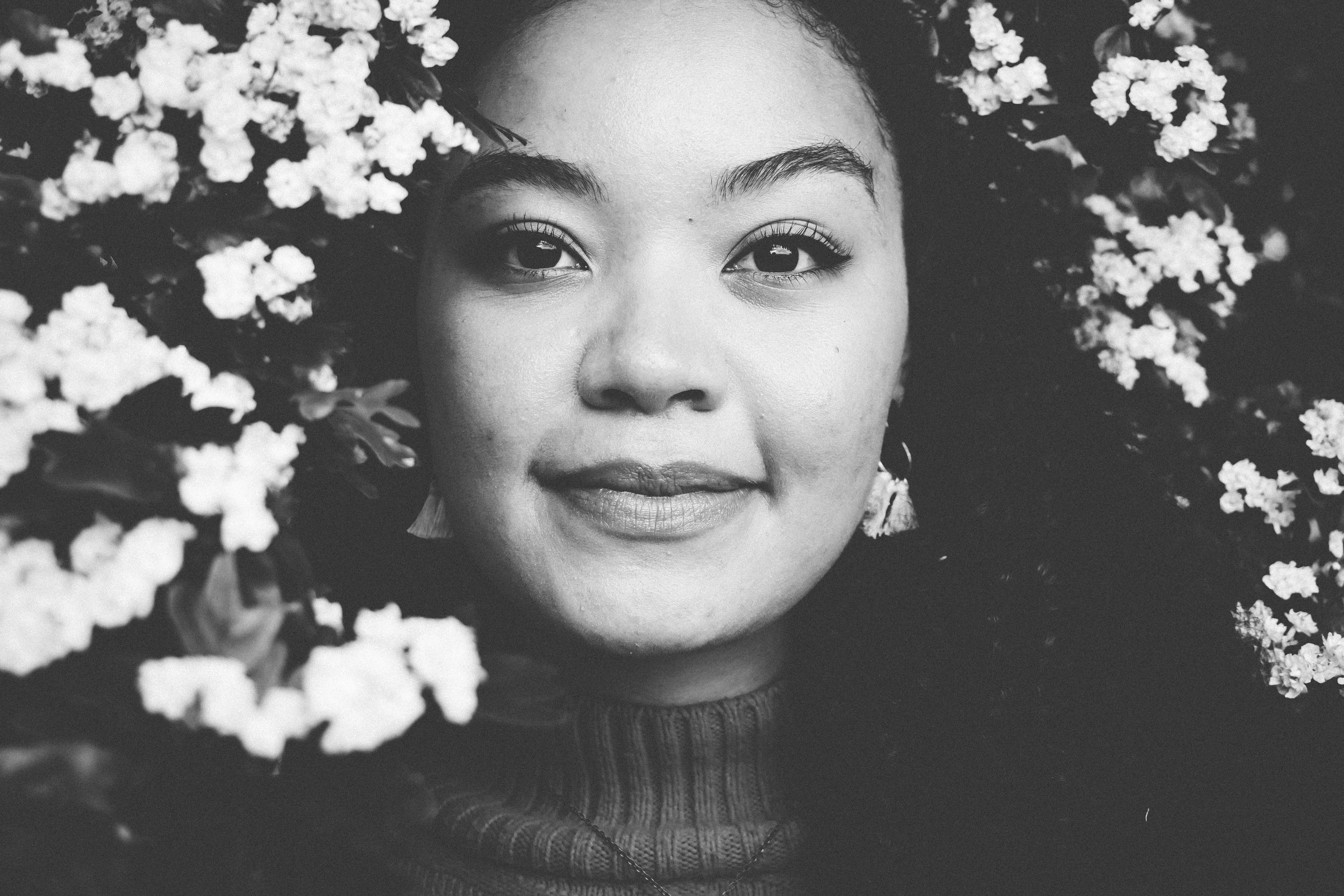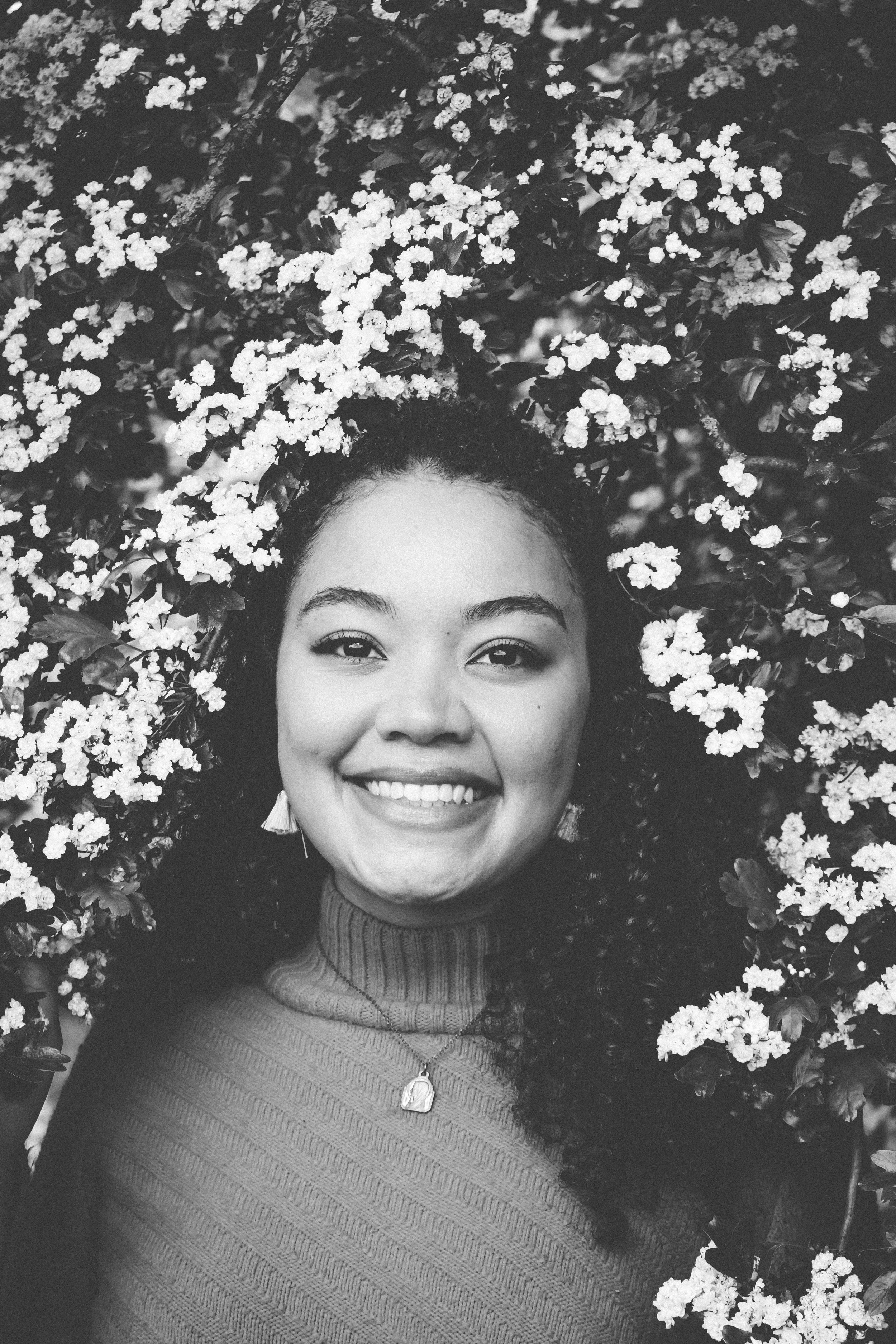Kayla Doris
What’s your full name?
Kayla-Joleen Doris.
How old are you?
25.
Where were you born/brought up?
I was born and raised in Luton. It’s very diverse but I didn’t appreciate that until I left home to study at uni in Southampton.
What do you do for a living?
I’m marketing executive at a coworking space in London. In my spare time I work on my project Reset Travel which I hope to grow into a business someday soon! The website explores travel and identity and how we change when we’re in new surroundings.
What’s your ethnicity?
Mixed British and Caribbean. My mum’s side are Scottish and English and my dad’s parents are Jamaican with Indian and Chinese ancestry.
How did your mum and dad meet?
(Don’t actually know this answer)
How old were you when you became conscious that people saw you differently? What impact did that have on you?
My school and college were really diverse, so I don’t remember ever feeling like people saw me differently as mixed race people weren’t unusual. It wasn’t until I left my hometown that I became aware that this wasn’t the case everywhere. A couple of weeks into uni, some of my new friends said they had been trying to guess where I was from for a while. It seemed crazy to me, as to me it’s so obvious, but I remember a couple of them thinking it was the Philippines (this was when I used to wear my hair straight.) I get it a lot when I travel as well - I’ve had people think I’m Thai, Brazilian and even Maltese. I generally find these situations funny, but in situations like with my uni friends it can feel a little weird even though I know they were just curious and there’s no harm in that. It’s a weird feeling because you feel very British - both my parents were born here and raised here and so were 2 of my grandparents and so on - but then being asked where you’re from can be a reminder that others don’t see you that way and they see you as different.
Describe your most memorable moments when you were made aware of being mixed race.
I always remember this time in school when a black classmate got really angry over my schoolbag that somehow he deemed too ‘white’. ‘Why are you wearing that bag? You’re black.’ I remember feeling really annoyed about his comment but at that age, I couldn’t put into words why. So I just replied that I was mixed race, which angered him even more. ‘You’re not mixed race. You’re black’ he said. This was over 10 years and I still remember it perfectly because of how much it angered me. How could someone try and tell me I wasn’t mixed race? Imagine someone telling you that you’re not white or you’re not black. That was the first time I felt the frustrations of being mixed race and the difficulty of being unable to express that feeling.
Do you feel your parents prepared you for life as a mixed race person?
I was raised by the white side of my family so I don’t think they really would have known how to prepare me for it. They didn’t see me as any different to them, so I think I didn’t see myself as any different, which then become confusing as I got older and realised that other people actually saw me as black.
What ignorant comments have you heard about being mixed-race that really rile you?
Growing up I would hear ignorant comments about mixed race girls in particular, the main one being at my school that mixed girls were stuck up or thought they were better than everyone else. I remember seeing tweets as well about mixed race girls apparently being ‘easier’ than other girls. I have no idea who came up with this stuff, but looking back now I wonder if it’s because all of the music videos that we used to watch were full of brown girls dancing around rappers. That was the only place on TV that I ever saw myself represented.
What do you wish people who aren’t mixed-race understood?
That being mixed is its own unique identity. People who aren’t mixed always want you to identify with one side. But I feel both of these sides, so why can’t I identify as both? I’ve had so many people try and correct me on my own identity and tell me I’m not mixed race, even after I’ve told them how I feel, which makes me feel like I’m talking to a brick wall. It literally makes me feel like I’m not being seen when people do that to me. If you’re not mixed, just listen and try to understand. If a mixed person tells you how they identify, then don’t challenge it and please, never correct them. You would never correct someone on being white or being gay for example, so why is it ok to do that to mixed people?
Do you think mixed race people/families are well represented in the media?
I’ve seen a few mixed families on adverts but not many. I definitely think we need to see more examples of mixed race families on tv but it would also have to be more than simply having a mixed family - it would be great to see the unique experiences of mixed children/teens as well.
Back in the late 19th century/early 20th century being mixed race held a stigma, as it was clear proof of interracial relations which was seen as an affront to society’s morals. Do you think it’s easier nowadays to be mixed race or is it more that racism has become subtler?
It’s definitely easier but that doesn’t mean we haven’t still got a long way to go. It’s also really easy to think that things aren’t as bad when you’re in the diverse bubble of London, but as soon as you go to other parts of the UK you realise how behind the rest of the country is. There’s a lot of difficult and uncomfortable race conversations going on at the moment but I’m really positive about the next generation.
Is being mixed race a burden or a blessing for you?
Honestly, I would say it’s been a mixture of the two. It’s a burden having to explain who you are all the time. Mixed race people are the only ones who have others decide their race for them. I’ve had people tell me they see me as white and people who see me as black. Even after I’ve tried explaining to them that I identify as mixed race. I’ve had white people say ignorant comments about black people in front of me as I’m not ‘properly black so it doesn’t count.’ Sometimes it feels like people don’t consider things from my viewpoint - they choose to see the side of me that they can identify with the easiest. I don’t get to choose how people see me and that’s the biggest burden of being mixed race. How I feel inside, isn’t represented on the outside like how it is for monoracial people. Being mixed might seem ‘cool’ and we might have ‘light skin privilege’, but that doesn’t mean it’s without its issues as well. On the plus side, it’s a blessing to be able to see things from both viewpoints and it’s great that I can use that to be vocal with arguments from both sides. I love that I have a different perspective and way of looking at things that the majority of people and want to start using that advantage more.
Have you felt a struggle with your identity? If so, how did you deal with it and if you are now at peace with who you are, how did you come to a place of self-acceptance?
I grew up completely confident in the fact that I was mixed. I always identified that way as I always felt both of those sides of me and to me that was very simple. It wasn’t until other people started having issues with it, that I started to become confused. I’ve had quite a few black people get annoyed with me for identifying as mixed and a couple of white people confused by it.
For a while, this was so confusing to me that I started to think maybe I should stop calling myself mixed race. I was so worried about offending someone or appearing like I was ‘denying’ my black side that I wouldn’t speak up if anyone said anything and would just let people identify me how they wanted to. But eventually that became so draining for me as I would go home and think about all the things I wish I had said and spend a lot of time just thinking about these situations over and over again and wondering why it bothered me so much. Eventually I realised it was because I wasn’t being authentic - I was letting others control how I was perceived, and it wasn’t until I started speaking up that anything was going to change. When I stopped feeling guilty for how I felt and realised I could be both things at once, I had a new sense of self-acceptance. Saying I’m mixed doesn’t mean I’m denying any part of me, it’s just saying that I’m both of those parts. Just because other people try and put me into one box, it doesn’t mean that I have to put myself into one. Realising that I can be and feel multiple things at once gave me the confidence to start explaining how it feels to be mixed race to others. It’s been a learning process, but the more vocal I am to, the more I can start to have some control over how I’m seen and start building my own identity.
What advice would you give to your younger self?
Speak up and don’t allow yourself to feel guilty for the way that you feel. And do not touch your hair! Just leave it alone. Step away from the straighteners, the scissors and the hair dye. Embrace everything that makes you different from everyone else.




